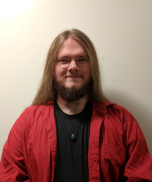Dr. Christoph Naefgen
 Foto: FernUniversität
Foto: FernUniversität
E-Mail: christoph.naefgen
Publications
Naefgen, C., & Gaschler, R., (2024). Variable, sometimes absent, but never negative: Applying multilevel models of variability to the backward crosstalk effect to find theoretical constraints. Acta Psychologica, 245, e104221. https://doi.org/10.1016/j.actpsy.2024.104221
Naefgen, C., Blech, C., Kriechbaumer, M., Haider, H., Ram, N., & Gaschler, R. (2023). Between- and within-subject covariance perspectives matter for investigations into the relationship between single- and dual-tasking performance, Methods in Psychology, 8, e100110, https://doi.org/10.1016/j.metip.2023.100110.
Naefgen, C., Gaschler, R., Ionescu, B., Pelzer, L., & Haider, H. (2022). Given the option, people avoid incongruent responses in a dual-tasking situation. Acta Psychologica, 228(103626), 103626. https://doi.org/10.1016/j.actpsy.2022.103626
Pelzer, L., Naefgen, C., Gaschler, R., & Haider, H. (2022). Learning of across- and within-task contingencies modulates partial-repetition costs in dual-tasking. Psychological Research, 86(3), 952–967. https://doi.org/10.1007/s00426-021-01518-1
Naefgen, C., & Gaschler, R. (2022). Trade-off vs. Common factor-differentiating resource-based explanations from their alternative. Frontiers in Psychology, 13, 774938. https://doi.org/10.3389/fpsyg.2022.774938
Pelzer, L., Haffmann, J., Naefgen, C., Gaschler, R., & Haider, H. (2022). Task-separation in dual-tasking: How action effects support the separation of the task streams. Acta Psychologica, 222(103464), 103464. https://doi.org/10.1016/j.actpsy.2021.103464
Janczyk, M., Naefgen, C. & Kunde, W. (2020) Are freely chosen actions generated by stimulus codes or effect codes?. Attention, Perception, & Psychophysics, 82, 3767-3773. doi:10.3758/s13414-020-02081-4
Naefgen, C., & Janczyk, M. (2019). Smaller backward crosstalk effects for free choice tasks are not the result of immediate conflict adaptation. Cognitive Processing, 20, 73-85. doi:10.1007/s10339-018-0887-0
Naefgen, C., & Janczyk, M. (2018). Free choice tasks as random generation tasks: an investigation through working memory manipulations. Experimental Brain Research, 236(8), 2263–2275. doi:10.1007/s00221-018-5295-2
Naefgen, C., Dambacher, M., & Janczyk, M. (2018). Why free choices take longer than forced choices: evidence from response threshold manipulations. Psychological Research, 82(6), 1039–1052. doi:10.1007/s00426-017-0887-1
Naefgen, C., Caissie, A. F., & Janczyk, M. (2017). Stimulus-response links and the backward crosstalk effect — A comparison of forced- and free-choice tasks. Acta Psychologica, 177, 23–29. doi:10.1016/j.actpsy.2017.03.010
Oberlader*, V. A., Naefgen*, C., Koppehele-Gossel, J., Quinten, L., Banse, R., & Schmidt, A. F. (2016). Validity of content-based techniques to distinguish true and fabricated statements: A meta-analysis. Law and Human Behavior, 40(4), 440–457. doi:10.1037/lhb0000193 (*: Shared first authorship)
Posters & Talks
Naefgen, C. & Blech, C., Kriechbaumer, M., Haider, H., Ram, N. & Gaschler, R. (March 2020). Within and between subject variability in dual task performance. Poster accepted for the 61. Tagung experimentell arbeitender Psychologen , Marburg, Germany (cancelled due to a pandemic).
Naefgen, C. & Janczyk, M. (March 2018). Working Memory Capacity Facilitates the Generation of Free Choices. Talk given at the 60. Tagung experimentell arbeitender Psychologen, Marburg, Germany.
Naefgen, C. & Janczyk, M. (September 2017). Working Memory Support Facilitates the Generation of Free Choices. Poster presentation at the 20th Conference of the European Society for Cognitive Psychology (ESCOP), Potsdam, Germany.
Naefgen, C. (July 2017). Working Memory Support Facilitates the Generation of Free Choices. Talk given at the 6. DoktorandInnen Workshop Allgemeine Psychologie, Ulm, Germany.
Naefgen, C. & Janczyk, M. (March 2017). Working Memory Support Facilitates the Generation of Free Choices. Talk given at the 59. Tagung experimentell arbeitender Psychologen, Dresden, Germany.
Naefgen, C. & Janczyk, M. (February 2017). On the relationship between working memory and the generation of free choices. Poster presentation at the Winter School „Human Action Control: Current Theories and Debates”, Tübingen, Germany.
Naefgen, C., Dambacher, M., & Janczyk, M. (November 2016). Why Free Choices Take Longer Than Forced Choices. Poster presentation at the Psychonomic Society's 57th Annual Meeting, Boston, MA, USA.
Naefgen, C., Dambacher, M., & Janczyk, M. (November 2016). Why free-choices take longer than forced-choices: Evidence from response threshold manipulations. Poster presentation at the 49. Herbsttreffen Experimentelle Kognitionspsychologie (HexKoP), Tübingen, Germany.
Naefgen, C. (June 2016). Why free choices take longer than forced choices. Talk given at the 6. DoktorandInnen Workshop Allgemeine Psychologie, Freiburg, Germany.
Naefgen, C., Dambacher, M., & Janczyk, M. (March 2016). Why Free Choices Take Longer Than Forced Choices. Talk given at the 58. Tagung experimentell arbeitender Psychologen, Heidelberg, Germany.
Naefgen, C., Caissie, A.F., & Janczyk, M. (November 2015). Stimulus-Response Links and the Backward Crosstalk Effect – A Comparison of Forced- and Free-Choice Tasks. Poster presentation at the Psychonomic Society's 56th Annual Meeting, Chicago, IL, USA.
Naefgen, C., Caissie, A.F., & Janczyk, M. (September 2015). Stimulus-response links and the backward crosstalk effect – A comparison of forced- and free-choice tasks. Poster presentation at the19th Conference of the European Society for Cognitive Psychology (ESCOP), Paphos, Cyprus.
Naefgen, C. (August 2015). Affect and the parallel constraint satisfaction model in decision making. Poster presentation at the International Summer School 2015 "Theories and Methods in Judgment and Decision Making Research", Ochenbruck, Germany.
Naefgen, C.,Schmidt, A.F., Koppehele-Gossel, J., Werner, V.A., & Banse, R.(July, 2014) How valid are content-based statement veracity assessment techniques? A meta-analysis. Talk given at the 28th International Congress of Applied Psychology, Paris, France.
Naefgen, C., Schmidt, A.F., Koppehele-Gossel, J., Werner, V.A., & Banse, R. (September 2013) How valid are content-based statement veracity assessment techniques? A meta-analysis. Session chair (Working group “Problems in assessment” (“Probleme der Begutachtung“)) and talk given at the 15. Fachgruppentagung Rechtspsychologie der Deutschen Gesellschaft für Psychologie (DGPs), Bonn, Germany.


